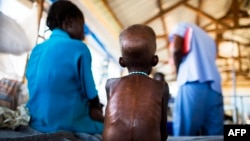After two years of war, the International Committee of the Red Cross warns hundreds of thousands of people in South Sudan are facing severe food shortages, with many at the point of starvation.
The organization warned that the level of hunger in South Sudan is alarmingly high, and many people are in desperate need of medical care.
The Swiss humanitarian organization said, for many people, the last two years have been a life on the run — in search of food and health care, and away from the dangers of warfare and sexual assault.
Florence Gillette, ICRC operations coordinator for South Sudan, has just returned from a mission to that country. She told VOA the ongoing fighting between the government and rebel forces has displaced more than 1.7 million South Sudanese in remote areas. She said many are effectively in hiding.
“Hiding in the bush — on islands," she said. "Sometimes on makeshift islands that they have made to stay out of reach of any attacks. These people are not feeling safe enough to return to their area of origin, to their home as they are grouped, in small groups, in those hard to reach areas that they actually fled for their lives and their physical integrity.”
Barely surviving
Gillette said the ICRC and other aid groups can occasionally provide these displaced people with food. But, she said, not enough is reaching them, and many are barely surviving on what they can gather in the forests and the fields.
As a consequence, she said malnutrition levels are extremely high in many areas.
Providing medical care is practically impossible in some places, she said. She noted there are many war wounded and right now people are particularly at risk of malaria and respiratory infections.
“It is difficult to say how many people are dying of those diseases because we can only work in some pockets because we do not have the means to cover the whole areas," she added.
The warring parties signed a peace agreement earlier this year. Ufortunately, the ICRC said ence persists and the humanitarian consequences of two years of conflict remain of great concern.
Besides the massive food needs, the agency said many people are separated from their loved ones, with little hope of returning to the homes they have fled.




